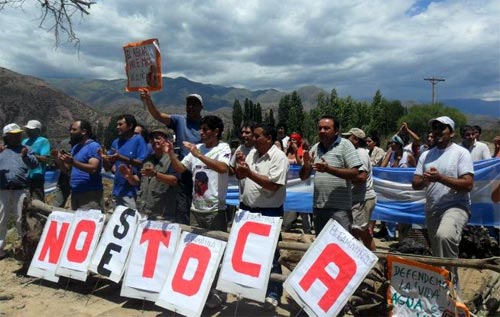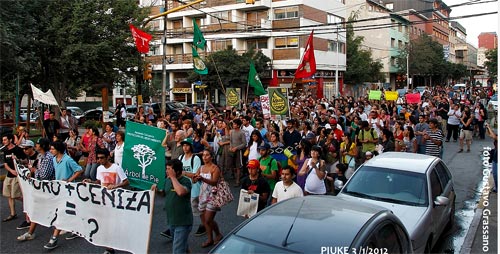Argentina: Governors assume electoral wins give mining companies "social license" to operate
Published by MAC on 2012-01-10Source: La Voz, Rio Negro
Assemblies and other local groups are trying to prove the thesis is wrong.
Some provincial governments seem to believe that the 54% victory by the FpV in the last presidential elections means a "social license" for all the foreign mining companies operating in Argentina. But assemblies and other local groups are trying to prove that thesis false.
The legislature of Río Negro province in Patagonia (dominated by the national ruling party FpV) has abrogated the ban on cyanide in mining enforced in 2005, which followed the first such law, passed in Chubut province in 2003.
The new scenario could lead to a reactivation of mining exploration in the province and opens a number of options to Pan American Silver as the owner of the Calcatreu gold project (one of the most advanced in the meseta area).
See earlier post: Río Negro passes bill banning cyanide use, Argentina (2005)
In response, more than one thousand protestors marched to the Civic Center of Bariloche demanding restoration of the law 3981.
 |
| Protest at La Rioja. Source: Indymedia Argentina |
On the road
As MAC anticipated last year, Osisko Mining faces renewed rejection of its attempt to enter the Famatina mountain range in La Rioja. See: Osisko Mining steps onto Famatina mountain range
Some 200 protesters are permanently blocking a road to access the mountain in Alto Carrizal (7 Km from Famatina).
Skedaddle on out! Says Esquel
Canadian company Yamana Gold had the great idea of changing the name of its Esquel gold project to "Suyai", allowing a rumour that it would go "underground".
On January 4, the Esquel Assembly marked 9 years of streets protests, held every 4th day of the month against mining of the area's mountains.
Many in Chubut fear the legislature (in which the ruling national party has the majority voting power) could follow that of Rio Negro in lifting mining restrictions imposed after noteworthy social mobilization processes.
Then Pan American Silver would be closer than ever to obtaining a permit to build the massive Navidad silver mine.
But that would be like killing two birds with one stone, wouldn't it?
Road block against Osisko Mining in La Rioja
http://www.lavoz.com.ar
4 January 2012
A citizen´s assembly initiated a “permanent” road block of the access road to the La Mejicana mine, in the strand of Famatina, to prevent the Canadian company Osisko Mining Corp from commencing exploration work in the area.
Some 200 members of the Chilecito and Famatina Assembly’s gathered 240 kilometers west of the provincial capital and 7 kilometers away from the town of Famatina, in Alto Carrizal, whilst the police deployed officers to the picket zones. The group stationed itself where the pavement on the provincial road 11 ends and the access road to La Mejicana, located at 2.381 meters above sea level, begins.
The assembly’s decided to restart a form of protest that had proved successful six years before, when they forced the decision of the company Barrick Gold to withdraw from the area. According to information from members of the assembly’s, the “permanent road block” counts on the support of the priest of Famatina, Omar Quinteros, who was amongst the protesters at the road block.
Massive march against the annulment of the anti-cyanide law in Bariloche
Río Negro newspaper
5 January 2012
 |
| Protest at Rio Negro. Source: Puike |
Community neighbors and organizations rejected the abolition of the anti-cyanide law and launched a plan to fight the decision.
On Tuesday a thousand people gathered in the Civic Centre of Bariloche to complain to the new governor, Alberto Weretilnek, and to condemn the members of the legislature who did approve the abolition of the anti-cyanide law.
With the slogan “no means no”, which could be seen on posters and banners along with other captions against the use of toxic substances in mining, the participants improvised an ethical judgment of all the representatives responsible for the legislative change, whom they declared “persona non grata” (unwelcome people).
The enthusiasm of the participants ignited an improvised march which covered the central areas of Mitre, Villegas and Moreno streets, returning to the Civic Centre where they called for a new protest “for life and human rights, for health and integrity” to take place the following Wednesday.
On this occasion they collected more than 600 signatures in support of the complaint against mining with cyanide. They also evaluated the possibility of demanding the government a referendum to give all the citizens of Río Negro the opportunity to express their opinion on this matter.
Alejandro Yaniello , a member of the ecological association Piuké, pointed out to Río Negro newspaper that “although the law has been passed, we don’t want it, and we are going to say so the government”. He also said that people are only just beginning to realize what the legislature had voted, and have come out to express their opposition through social networks and in the streets. “It is no coincidence that they have voted for this law in the middle of the holiday period” he warned.
The protest was promoted by the organisations Piuké, Árbol de Pié, Piuké, Comunidad del Limay and Lihué, who expressed strong criticism of the government´s project to develop open pit mining with the use of cyanide.